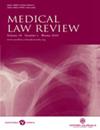DNACPR Decisions: Aligning Law, Guidance, and Practice.
IF 1.8
4区 医学
Q1 LAW
引用次数: 1
Abstract
Do not attempt cardiopulmonary resuscitation (DNACPR) decisions are a means to consider in advance the appropriateness of CPR measures if an acute crisis arises. During the COVID-19 pandemic, problems with such decisions, for example the putting in place of DNACPR decisions for all residents of certain care homes, received a lot of attention, prompting a Care Quality Commission (CQC) report with recommendations for improvement. Building on the CQC report, our article addresses a cluster of legal uncertainties surrounding DNACPR decisions, in particular about the grounds for such decisions and the correct procedures for the legally required consultation, including with whom to consult. This article will also analyse commonly used DNACPR forms, as well as the Recommended Summary Plan for Emergency Care and Treatment (ReSPECT) form, which aims to incorporate DNACPR decisions as part of more holistic end-of-life care planning. The analysis shows that all forms exhibit shortcomings in reflecting the legal requirements for DNACPR decisions. We recommend a number of changes to the forms aimed at rendering DNACPR practice compliant with the law and more protective of the person's human rights.DNACPR决定:调整法律、指导和实践。
不要尝试心肺复苏(dacpr)的决定是一种手段,提前考虑心肺复苏措施的适当性,如果急性危机出现。在2019冠状病毒病大流行期间,此类决策的问题,例如为某些养老院的所有居民制定DNACPR决策,受到了很多关注,促使护理质量委员会(CQC)发布了一份报告,提出了改进建议。在CQC报告的基础上,我们的文章讨论了围绕DNACPR决定的一系列法律不确定性,特别是这些决定的依据和法律要求的正确咨询程序,包括咨询谁。本文还将分析常用的DNACPR表格,以及建议的紧急护理和治疗总结计划(ReSPECT)表格,该表格旨在将DNACPR决策纳入更全面的临终关怀计划。分析表明,所有形式在反映DNACPR决定的法律要求方面都存在缺陷。我们建议对表格进行一些修改,以使DNACPR的做法符合法律,并更加保护个人的人权。
本文章由计算机程序翻译,如有差异,请以英文原文为准。
求助全文
约1分钟内获得全文
求助全文
来源期刊

Medical Law Review
MEDICAL ETHICS-
CiteScore
3.10
自引率
11.80%
发文量
50
审稿时长
>12 weeks
期刊介绍:
The Medical Law Review is established as an authoritative source of reference for academics, lawyers, legal and medical practitioners, law students, and anyone interested in healthcare and the law.
The journal presents articles of international interest which provide thorough analyses and comment on the wide range of topical issues that are fundamental to this expanding area of law. In addition, commentary sections provide in depth explorations of topical aspects of the field.
 求助内容:
求助内容: 应助结果提醒方式:
应助结果提醒方式:


